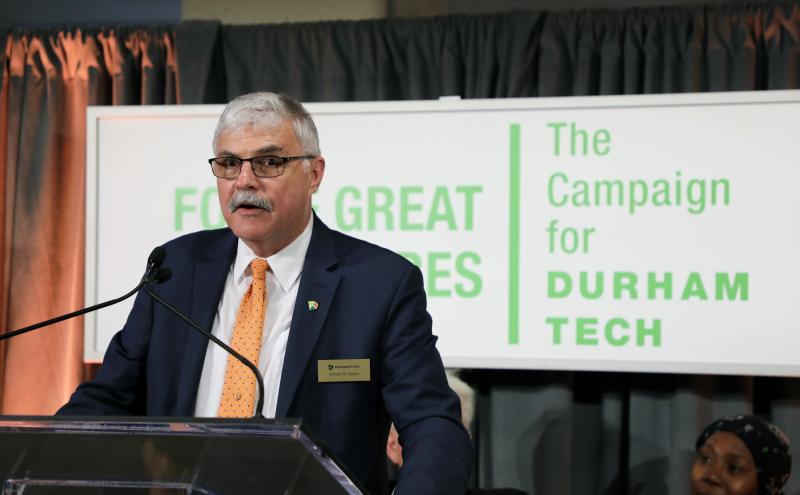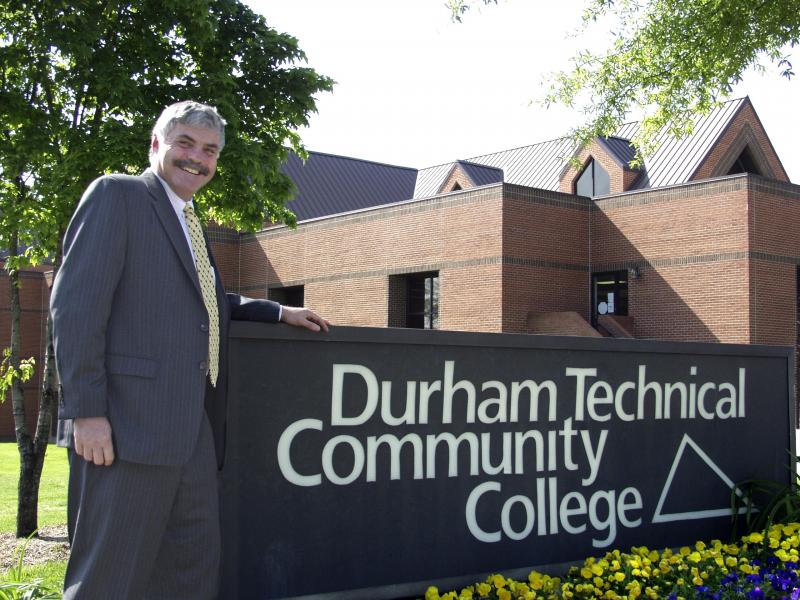60 for 60: President Ingram retired after nearly 40 years, was a ‘difference maker’

In celebration of Durham Technical Community College’s 60th anniversary, the College is publishing 60 for 60 – a storytelling campaign that highlights the people, places, and events that have progressed and shaped the College’s six decades of impact. The following story has been republished in its entirety. To view more 60 for 60 stories, visit www.durhamtech.edu/60for60.
Durham Tech President Bill Ingram signs out of a virtual meeting and quickly clacks away at a handful of emails before his next call.
It’s a warm Friday morning in June and his calendar is packed: an open discussion of race and equity from the College’s leadership, a COVID-19 task force meeting that tackles the unprecedented disruption to operations, and a small gathering to install the final beam for a new Applied Technologies Building that’s taking shape outside his window.
Dr. Ingram’s office in the Educational Resources Center is disappearing a box or so at a time. He jokes that he’s been slowly chipping away at packing personal effects as his retirement on the last day of June grows near.
A stainless steel and brass chess set, whittled in the on-campus machining shop decades ago by a Durham Tech graduate, sits on a bookshelf – one of the last remaining items. The set belonged to Dr. Ingram’s predecessor, Dr. Phail Wynn Jr., and will soon have a new steward.
It’s the final few weeks of Dr. Ingram’s illustrious 36-year career at Durham Tech. In his time at the College, Ingram has served in a litany of roles, first in continuing education and later in career and technical education.
In January 2008, the Board of Trustees appointed him to the College’s top post. Shortly after, the bottom fell out of the country’s banking and housing industries as the economy plummeted.
“I took office about 20 minutes before the Great Recession,” Ingram said.
Ingram handled the moment, like he has on this Friday, by pulling the College’s experts together and looking for the right path forward.
In many ways, Ingram is one of the most accomplished community college presidents in the state and is widely revered by those who have worked with him. Since taking the helm at Durham Tech, he has set a number of milestones – a $20 million bond initiative in 2016, the largest for the College; the College’s biggest fundraising effort, Forge Great Futures: The Campaign for Durham Tech, which raised $5 million; a college-wide rebrand; and the creation of the Center for the Global Learner, Center for College and Community Service, and the Office of Equity and Inclusion.
Ingram also spearheaded the expansion of the College’s physical footprint with new campus locations in the downtown Chesterfield Building, American Tobacco Campus, and Duke Street North. The College recently purchased property at 1551 Cooper Street, adjacent with Main Campus, and has overseen construction of a new Facilities building and the soon-to-be Applied Technologies building.
But at the end of the day, Ingram’s passion is the people – no matter the program or path – who have inspired him for nearly four decades.
‘Role of good leaders’
Bill Ingram remembers what it felt like to be a college student, back at Ohio Wesleyan University in the early 1970s.
His parents encouraged him to go to college, but after enrolling at the Delaware, Ohio, institution, he quickly realized he wasn’t ready.

“I was supremely unprepared emotionally to be a college student,” Ingram said. “After a couple of years of lackluster performance I found myself below a C level and was out of college for a year. I knocked around and had some jobs in the area, came back for a year and still wasn’t ready. The second time I was asked to leave. I was told this isn’t the place for you.”
Ingram has joked over the years that he may well be the only community college president to flunk out of school twice, but at Durham Tech he’s used the experience in his approach to students, his focus on providing resources, and the policies for students looking for a second chance.
Following his second stint, Ingram joined the Ohio Wesleyan University campus police department, working his way up to director of campus police – where he was eligible for one course each semester. He took the opportunity, slowly earning a Bachelor of Arts in English. During that time, he met his now-wife, Ann, and in 1981 moved to Chatham County and later Orange County as she began a master’s degree at UNC-Chapel Hill. They moved to Durham in 1987.
He knew campus police wasn’t the right fit for his next step, momentarily mulled the idea of journalism, and eventually took a job with Durham Public Schools as the coordinator of adult evening programs at Jordan High School. The course was sponsored by then-Durham Technical Institute.
It wasn’t long and Ingram had taken a full-time job with the College, saw a promotion, and achieved his master’s degree (and later doctorate). When Dr. Wynn announced his retirement, Ingram said he felt he could provide a vision for the college community and the steps to move it forward.
“I thought why not. I had a skillset that I thought might make sense,” Ingram said. “I’d done enough teaching to know two things about teaching: it’s hard work and I’m not very good at it. But I thought I had the ability to articulate a vision for how a community college should operate and how to marshal interest around that. To help a group of leaders identify ways they can do their jobs more effectively and more efficiently. The role of good leaders is to help people do their jobs more effectively.”
‘Difference Maker’
Despite Ingram’s modesty for teaching, he’s built a reputation as a mentor for doctoral students, other community colleges presidents, and budding Durham Tech employees.

Dr. Eileen Baccus, president emeritus at Northwestern Connecticut Community College and the Durham Tech leadership coach for Achieving the Dream, said Ingram set the bar higher for developing an administration than any community college president she’s seen in her career.
“Bill Ingram has done more in terms of pushing for the professional development of his administration and faculty than any president I've worked with before across the country,” Baccus said. “He's really created a cadre of doctoral recipients that I've never experienced. I've never seen that across the country. When you have a leader that's focused on the development, the professional development of the staff and faculty, you have someone that 's going to make a lasting impact on the institution.”
Baccus would know. She served as president of Northwestern for 18 years and has worked with Durham Tech for nearly 16 years.
During that time, she said, she’s seen Durham Tech grow into a leader in equity and inclusion and make a financial commitment to providing resources for students, especially low-income students or those in need of emergency resources.
"I have not seen another president use so many vehicles – be they community or state, or local, or institutional funds – to help students in their times of need,” she said. “It has been remarkable to see what he's done."
Others around the state have also looked to Ingram as a leading voice.
Garrett Hinshaw, president of Catawba Valley Community College in Hickory, said Ingram was one of the first to welcome him after Hinshaw was appointed. It made a lasting impression on the then-39-year-old newcomer.
“Bill Ingram’s impact on me has been monumental,” Hinshaw said. “I’m really going to miss Bill’s knowledge, his insight, and his friendship as he goes into another chapter. He’s one of those difference makers that only comes along once in a while.”
— Garrett Hinshaw, president of Catawba Valley Community College
In Durham and Orange counties, Ingram has worked to position the College as a talent pipeline, serving on boards for Durham and Chapel Hill-Carrboro chambers of commerce, Discover Durham, and Made in Durham.
Casey Steinbacher, executive director of Made In Durham and former President and CEO of the Durham Chamber, said Ingram was a great community leader – collaborating on projects and working to meet employer needs.
Steinbacher has worked with Ingram since she took over as head of the Chamber in late 2007. She’s since worked with him through their roles with Made In Durham, a collective impact organization focused on re-engaging disconnected youth in education and career opportunities.
On two occasions, Steinbacher recalled, she phoned Ingram after industry and community leaders asked for more trained talent. Both instances – a need for sterile processing technicians and programmers – quickly led to course offerings at the College and a line of graduates for industry.
Ingram wasn’t flashy, but he was deeply dedicated to helping students, oftentimes without the acknowledgment. When Durham Tech started the Gateway To College program – a high school credential program for students 16-24 years old – Steinbacher said it was originally a Durham Public School funded initiative, but when the funding stream ended, Ingram vowed to keep the program going with Durham Tech dollars.
"He was just the kind of person -- he was about solutions,” Steinbacher said. “I think that really made a difference in our relationships. We were very much about, ‘Let's not be afraid of the problem.’”
‘Architect for systems’
As Ingram has grown the College’s presence in the community, he’s also made a number of structural changes inside the institution.
In Fall 2009, Ingram oversaw the creation of the Center for the Global Learner, a now-cornerstone of Durham Tech that supports intercultural efforts and resources for international, DACA, and undocumented students.
He created and oversaw the expansion of the Office of Institutional Equity and Inclusion, which began in July 2016. And most recently in 2019, he started the process of a College-wide restructure, merging curriculum offerings with continuing education courses.
Durham Tech Executive Vice President Tom Jaynes said Ingram has approached the developing of the College with a mind always fixed on the future – and more importantly, the community’s needs.
As the country watches forecasts of a down-turning economy, skyrocketing unemployment, calls for change to societal structures, Ingram sees parallels to the start of his tenure – bookends to a presidency. But the College is more prepared than ever to meet demands and to support the community in an equity-minded world. More work is needed, Ingram is quick to say, but the College is ready for it.
As he plans his last days as president, Ingram said he’s most proud of more than 10,000 graduates since he took the helm. As to future plans? He shrugs off the question.
It was never about him, he said. It was always about the people.
As Baccus, the College’s Achieving the Dream coach, looked back on the years of Ingram’s leadership and it’s impact on the community, she said Ingram’s legacy is sure to be lasting.
“Any one who goes into the role of a college president is taking on a role in which you want to make a difference,” Baccus said. “You want to show that you’ve done something that’s made a lasting impact. Bill has certainly done a lot to make a difference at Durham Tech.”
____________________________________________
Contact Marketing and Communications Director Nathan Hardin at hardinn@durhamtech.edu or 919.536.7246, ext. 5206.
More Durham Tech News >

